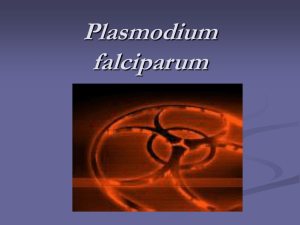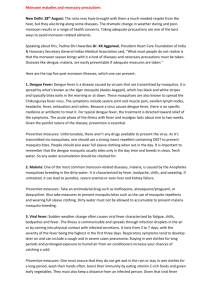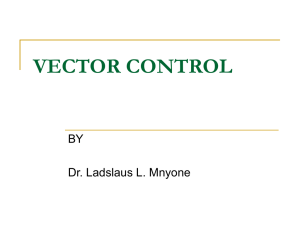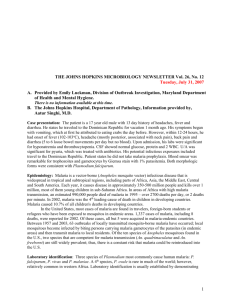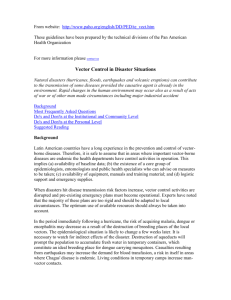Chagas Diseases - JAJ International
advertisement
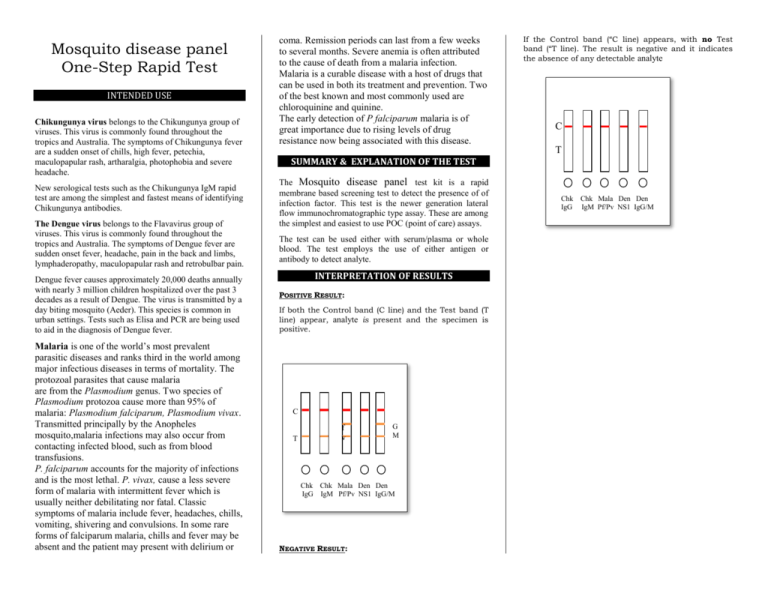
Mosquito disease panel One-Step Rapid Test INTENDED USE Chikungunya virus belongs to the Chikungunya group of viruses. This virus is commonly found throughout the tropics and Australia. The symptoms of Chikungunya fever are a sudden onset of chills, high fever, petechia, maculopapular rash, artharalgia, photophobia and severe headache. New serological tests such as the Chikungunya IgM rapid test are among the simplest and fastest means of identifying Chikungunya antibodies. The Dengue virus belongs to the Flavavirus group of viruses. This virus is commonly found throughout the tropics and Australia. The symptoms of Dengue fever are sudden onset fever, headache, pain in the back and limbs, lymphaderopathy, maculopapular rash and retrobulbar pain. Dengue fever causes approximately 20,000 deaths annually with nearly 3 million children hospitalized over the past 3 decades as a result of Dengue. The virus is transmitted by a day biting mosquito (Aeder). This species is common in urban settings. Tests such as Elisa and PCR are being used to aid in the diagnosis of Dengue fever. Malaria is one of the world’s most prevalent parasitic diseases and ranks third in the world among major infectious diseases in terms of mortality. The protozoal parasites that cause malaria are from the Plasmodium genus. Two species of Plasmodium protozoa cause more than 95% of malaria: Plasmodium falciparum, Plasmodium vivax. Transmitted principally by the Anopheles mosquito,malaria infections may also occur from contacting infected blood, such as from blood transfusions. P. falciparum accounts for the majority of infections and is the most lethal. P. vivax, cause a less severe form of malaria with intermittent fever which is usually neither debilitating nor fatal. Classic symptoms of malaria include fever, headaches, chills, vomiting, shivering and convulsions. In some rare forms of falciparum malaria, chills and fever may be absent and the patient may present with delirium or coma. Remission periods can last from a few weeks to several months. Severe anemia is often attributed to the cause of death from a malaria infection. Malaria is a curable disease with a host of drugs that can be used in both its treatment and prevention. Two of the best known and most commonly used are chloroquinine and quinine. The early detection of P falciparum malaria is of great importance due to rising levels of drug resistance now being associated with this disease. If the Control band (“C line) appears, with no Test band (“T line). The result is negative and it indicates the absence of any detectable analyte C T SUMMARY & EXPLANATION OF THE TEST The Mosquito disease panel test kit is a rapid membrane based screening test to detect the presence of of infection factor. This test is the newer generation lateral flow immunochromatographic type assay. These are among the simplest and easiest to use POC (point of care) assays. The test can be used either with serum/plasma or whole blood. The test employs the use of either antigen or antibody to detect analyte. INTERPRETATION OF RESULTS POSITIVE RESULT: If both the Control band (C line) and the Test band (T line) appear, analyte is present and the specimen is positive. C T f v G M Chk Chk Mala Den Den IgG IgM Pf/Pv NS1 IgG/M NEGATIVE RESULT: Chk Chk Mala Den Den IgG IgM Pf/Pv NS1 IgG/M
